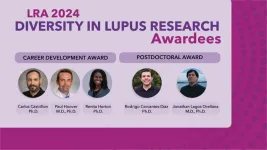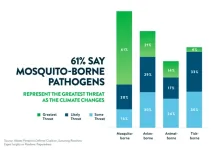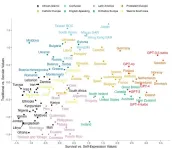(Press-News.org) WASHINGTON—Consuming moderate amounts of coffee and caffeine regularly may offer a protective effect against developing multiple cardiometabolic diseases, including type 2 diabetes, coronary heart disease and stroke, according to new research published in the Endocrine Society’s Journal of Clinical Endocrinology & Metabolism.
Researchers found that regular coffee or caffeine intake, especially at moderate levels, was associated with a lower risk of new-onset cardiometabolic multimorbidity (CM), which refers to the coexistence of at least two cardiometabolic diseases.
The prevalence of individuals with multiple cardiometabolic diseases, or CM, is becoming an increasing public health concern as populations age around the world, notes the study.
Coffee and caffeine consumption could play an important protective role in almost all phases of CM development, researchers found.
“Consuming three cups of coffee, or 200-300 mg caffeine, per day might help to reduce the risk of developing cardiometabolic multimorbidity in individuals without any cardiometabolic disease,” said the study’s lead author Chaofu Ke, M.D., Ph.D., of the Department of Epidemiology and Biostatistics, School of Public Health at Suzhou Medical College of Soochow University, in Suzhou, China.
The study found that compared with non-consumers or consumers of less than 100mg caffeine per day, consumers of moderate amount of coffee (3 drinks per day) or caffeine (200-300 mg per day) had the lowest risk for new-onset CM.
The study found that compared with non-consumers or consumers of less than 100mg caffeine per day, consumers of moderate amount of coffee (3 drinks per day) or caffeine (200-300 mg per day) had a 48.1% or 40.7% reduced risk for new-onset CM.
Ke and his colleagues based their findings on data from the UK Biobank, a large and detailed longitudinal dietary study with over 500,000 participants aged 37-73 years. The study excluded individuals who had ambiguous information on caffeine intake. The resulting pool of participants included a total of 172,315 individuals who were free of any cardiometabolic diseases at baseline for the analyses of caffeine, and a corresponding 188,091 individuals for the analyses of coffee and tea consumption.
The participants’ cardiometabolic diseases outcomes were identified from self-reported medical conditions, primary care data, linked inpatient hospital data and death registry records linked to the UK Biobank.
Coffee and caffeine intake at all levels were inversely associated with the risk of new-onset CM in participants without cardiometabolic diseases. Those who reported moderate coffee or caffeine intake had the lowest risk, the study found. Moderate coffee or caffeine intake was inversely associated with almost all developmental stages of CM.
“The findings highlight that promoting moderate amounts of coffee or caffeine intake as a dietary habit to healthy people might have far-reaching benefits for the prevention of CM,” Ke said.
Addressing a Research Gap
Numerous epidemiological studies have revealed the protective effects of coffee, tea and caffeine consumption on morbidity of single cardiometabolic diseases. However, the potential effects of these beverages on the development of CM were largely unknown.
The authors reviewed the available research on this topic and found people with single cardiometabolic disease may have a two-fold higher all-cause mortality risk than those free of any cardiometabolic diseases. By contrast, the researchers found individuals with CM may have an almost 4 to 7 times higher risk of all-cause mortality. The researchers also noted that CM may present higher risks of loss of physical function and mental stress than those with single diseases.
Other study authors include: Xujia Lu, Guochen Li, Luying Wu, Liping Shao, Yulong Fan, and Chen-Wei Pan of Soochow University; Xiaohong Zhu of Suzhou Centers for Disease Control and Prevention in Suzhou, China; Ying Wu of the Southern Medical University in Guangzhou, China; and Yan Borné of Lund University in Malmö, Sweden.
The National Natural Science Foundation of China, the Project of MOE Key Laboratory of Geriatric Diseases and Immunology, and the Research on Key Technologies for the Prevention and Control of Major Diseases and Infectious Diseases in Suzhou funded the study.
The manuscript, “Habitual Coffee, Tea and Caffeine Consumption, Circulating Metabolites, and the Risk of Cardiometabolic Multimorbidity,” was published online, ahead print.
# # #
Endocrinologists are at the core of solving the most pressing health problems of our time, from diabetes and obesity to infertility, bone health, and hormone-related cancers. The Endocrine Society is the world’s oldest and largest organization of scientists devoted to hormone research and physicians who care for people with hormone-related conditions.
The Society has more than 18,000 members, including scientists, physicians, educators, nurses and students in 122 countries. To learn more about the Society and the field of endocrinology, visit our site at www.endocrine.org. Follow us on Twitter at @TheEndoSociety and @EndoMedia.
END
Moderate coffee and caffeine consumption is associated with lower risk of developing multiple cardiometabolic diseases, new study finds
2024-09-17
ELSE PRESS RELEASES FROM THIS DATE:
New four-year, $3.26 million grant from the National Institute of Neurological Disorders and Stroke establishes the Mount Sinai Center for Undiagnosed Diseases
2024-09-17
New York, NY (September 17, 2024) – A new four-year, $3.26 million grant from the National Institute of Neurological Disorders and Stroke (NINDS), a part of the National Institutes of Health (NIH), establishes the first Undiagnosed Diseases Network (UDN) site in the New York metropolitan area. Patients of all ages with difficult-to-diagnose diseases can apply to have their cases studied intensively by the new Mount Sinai Center for Undiagnosed Diseases using state-of-the-art genomic approaches as soon as the beginning of 2025.
These funds expand the work of the Undiagnosed Diseases Program, previously ...
Lupus Research Alliance announces recipients of 2024 Diversity in Lupus Research Awards
2024-09-17
New York, NY. September 17. The Lupus Research Alliance (LRA) is pleased to announce the recipients of the 2024 Career Development and Postdoctoral Awards to Promote Diversity in Lupus Research. Launched in 2021, the Diversity in Lupus Research (DLR) Awards aim to foster the development and productivity of exceptional early-career and postdoctoral scientists from underrepresented minority groups in science.
Lupus is a debilitating autoimmune disease that disproportionately affects Black, Hispanic, Indigenous, and Asian/Pacific Islander people. The LRA inaugurated the DLR Awards three years ...
New survey from Abbott finds epidemiologists believe viral and mosquito-borne pathogens are priority concerns for disease outbreaks
2024-09-17
Survey reveals that infectious disease experts see the need to address gaps in surveillance programs to identify emerging pathogens, public health funding and testing infrastructure capabilities
They point to viral pathogens and mosquito-borne pathogens as likely to spark outbreaks as humans, animals and viruses overlap; and new viruses are as concerning as changes to existing viruses
Experts believe robust tracking of changing insect range, animal habitats and their migrations and extreme weather events are important to understanding infectious diseases and changing risk patterns
ABBOTT PARK, Ill., ...
A wobble from Mars could be sign of dark matter, MIT study finds
2024-09-17
In a new study, MIT physicists propose that if most of the dark matter in the universe is made up of microscopic primordial black holes — an idea first proposed in the 1970s — then these gravitational dwarfs should zoom through our solar system at least once per decade. A flyby like this, the researchers predict, would introduce a wobble into Mars’ orbit, to a degree that today’s technology could actually detect.
Such a detection could lend support to the idea that primordial black holes are a primary source of dark matter throughout the universe.
“Given decades of precision ...
In step toward solar fuels, durable artificial photosynthesis setup chains two carbons together
2024-09-17
Images
A key step toward reusing CO2 to make sustainable fuels is chaining carbon atoms together, and an artificial photosynthesis system developed at the University of Michigan can bind two of them into hydrocarbons with field-leading performance.
The system produces ethylene with efficiency, yield and longevity well above other artificial photosynthesis systems. Ethylene is a hydrocarbon typically used in plastics, so one direct application of the system would be to harvest carbon dioxide that would otherwise be vented into the atmosphere for making plastics.
"The performance, or the activity and stability, is about five to six times better than what is typically reported ...
Risk of clots, stroke from incorrect blood thinner dosing reduced using online dashboard
2024-09-17
Doctors and pharmacists treating people with blood thinners can reduce the rate of inappropriate dosing — as well as blood clots and strokes that can result from it — using an electronic patient management system, a study suggests.
The online dashboard, developed by the United States Veterans Health Administration in 2016, was designed to highlight and optimize the treatment of patients with direct oral anticoagulants, or DOACs, the most commonly prescribed blood thinners.
Researchers led by Michigan Medicine used the tool to assess over 120,000 cases in which patients with atrial fibrillation or venous thromboembolism, blood clots in the veins, were treated with ...
Juan Jimenez named Blavatnik Regional Awards finalist
2024-09-17
UPTON, N.Y. — The Blavatnik Family Foundation and the New York Academy of Sciences have recognized chemical engineer Juan Jimenez as a Finalist in the 2024 Blavatnik Regional Awards for Young Scientists. Jimenez’s catalysis science research at the U.S. Department of Energy’s (DOE) Brookhaven National Laboratory opens doors for turning climate change-driving gases into industrially useful materials.
The yearly honor is awarded to distinguished early career researchers at institutions in ...
Nine outstanding postdoctoral scholars for the 2024 Blavatnik Regional Awards for Young Scientists announced
2024-09-17
NEW YORK – September 17, 2024 – The Blavatnik Family Foundation and The New York Academy of Sciences today announced the three Laureates and six Finalists of the 2024 Blavatnik Regional Awards for Young Scientists. The Awards honor outstanding postdoctoral scientists from academic research institutions across New York, New Jersey, and Connecticut.
The Blavatnik Regional Awards jury, consisting of distinguished scientists and engineers, selected one Laureate in each category who will receive a $30,000 unrestricted prize and two Finalists in each category who will be awarded $10,000 ...
People underestimate the income of the top 1%
2024-09-17
People selectively underestimate how rich the world’s richest people are, according to a study. Increasing income inequality in many countries is driven by steep gains among the top 1% of earners. In the United States, support for policies that would redistribute wealth has not increased since the 1970s, even as the share of incomes held by the top 1% of Americans jumped from 10% to 19%. Barnabas Szaszi and colleagues conducted four studies to explore how well people understand the wealth held by others. In one study, 990 US residents ...
ChatGPT and cultural bias
2024-09-17
A study finds that ChatGPT expresses cultural values resembling people in English-speaking and Protestant European countries. Large language models, including ChatGPT, are trained on data that overrepresent certain countries and cultures, raising the possibility that the output from these models may be culturally biased. René F Kizilcec and colleagues asked five different versions of OpenAI’s GPT to answer 10 questions drawn from the World Values Survey, an established measure of cultural values used for decades to collect data from countries around the world. The ten questions place respondents ...




